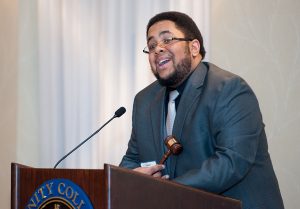 DEGREES: B.A. in human rights studies and with honors in philosophy; M.S. in education, with a focus on special education, Brooklyn College
DEGREES: B.A. in human rights studies and with honors in philosophy; M.S. in education, with a focus on special education, Brooklyn College
JOB TITLE: Assistant to the principal, Achievement First Brooklyn High School
FAVORITE TRINITY MEMORY: My favorite Trinity memory is a bittersweet one. It was the moment that I watched my parents pull off from Mather Hall to return to Brooklyn on my first official day as a Trinity student. While that was a difficult feeling, it was coupled with the excitement of now being a scholar of the liberal arts, tasked with expanding the bounds of my knowledge and the notions of my experiences in a guided but unfettered fashion. What greater privilege exists than to pay that scholarship forward to others?
Why did you want to be involved in education?
My time at Trinity helped focus my passion for social justice through the prism of education as a transformative tool. This clicked for me while I was studying abroad through the Trinity in Vienna program. I spoke with a Teach For America recruiter over Skype from Trinity, and one year later, I was an applicant, and by graduation, a corps member. That was my initial foray into the work of educating young people. Serving back in my childhood community of Brooklyn was a further honor.
What do you enjoy most about your work?
I enjoy most the bonds that I build with students. I often see reflections of my teenaged self through their journey toward collegiate scholarship. Whether you are in the classroom or working with students in a logistical capacity, I find that you are always a mentor and an example. The “bottom line” for organizations like Apple or Boeing is profit, a fuel that empowers them to continue to offer their services. In education, our “bottom line” is the scholastic success and socioemotional development of our scholars. This fuel empowers us to continue to provide equal access to an uncompromised education to provide various opportunities to get into and through a rigorous college of their choice. Charlene Taylor, a student in the Class of 2021, comes from my high school, Achievement First Brooklyn High School; of this I am particularly proud.
What are the biggest challenges you face?
Many challenges of my work come from the added variables of the lived experiences of my students, many of whom are from socioeconomically and politically disadvantaged areas. Some folks conduct invaluable research quantifying the education achievement gap. They correlate history, sociology, and demographics to the current conditions of our schools and rates of success for the students they serve; however, once you are inside a school building, this research manifests in very tangible ways through the struggles of many scholars, and this can be particularly challenging in my work. Collating and distinguishing the marks of adolescence from the scars of historical and contemporary systems of oppression is difficult.
Was there a professor who was particularly influential?
My short answer is no. There were too many professors who helped shape my intellectual journey. Is that not the beauty of education and the kind of liberal arts experience that Trinity offers? However, I would like to give a shout-out a few professors. Professors [Todd] Ryan, [Maurice] Wade, [Donna-Dale] Marcano, [Erik] Vogt, [Drew] Hyland, and [W. Miller] Brown helped shape my philosophical understanding of many human social constructs, but classes with Professor J. [Johnny] Williams, [Stephen] Valocchi, [Benjamin] Carbonetti, [Sonia] Cardenas, and [Serena] Laws (among others) offered an even more varied understanding of how we operationalize these constructs in our daily, pragmatic lives. Those experiences inform the work I do every day. Every bridge built with a scholar unpacks social baggage that often impedes their success, and my time in Trinity’s halls provided tools with which to decipher that baggage to pull out solutions.
What was the most memorable course you took at Trinity?
Given the previous question, I likewise struggle to pull out one classroom experience and a special highlight, though I will say that “Society, State and Power” with Professor Williams, “Human Rights: Philosophical Foundations” with Professor Wade, “Race, Racism & Philosophy” with Professor Marcano, “Philosophy of Religion” with Professor Ryan, “Introduction to Philosophy” with Professor Brown, and “Social Movements” with Professor Valocchi were all high points. While I can think of a half dozen other amazing experiences, these spurred levels of intellectual engagement and enjoyment that I try to instill in scholars every day.